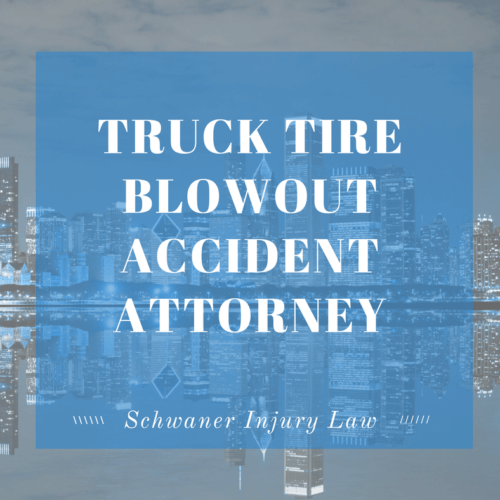
Truck Tire Blowout Accident Attorney
Virtually every interstate in the country is littered with strips of tread from tire blowouts, considered one of the top causes of accidents on America’s roadways, especially when the tire in question is one that was once an 18-wheeler.
According to the National Highway Traffic Safety Administration, tire blowouts are estimated to cause approximately 78,000 motor vehicle accidents every year in the U.S., and if that blowout involves a semi it can be catastrophic, especially if the event occurs in heavy traffic.
When a tire blowout happens, it happens suddenly and unexpectedly, and can easily cause even the most experienced semi driver to lose control of his or her tractor-trailer, putting everyone in the truck’s path in jeopardy. If the driver is unable to control the rig, nearby vehicles are at risk of being hit.
In 2011, a tire blowout caused a semi’s trailer to fall off an Illinois overpass crash on the road beneath it, landing on a minivan and causing both the trailer and the passenger vehicle to erupt into a ball of flames. The driver was not charged in the accident.
What Causes Tire Blowouts?
There are a variety of reasons why tire blowouts occur, including debris on the road such as glass, car parts from previous accidents, or nails that can puncture the tire, causing it to explode. Extreme temperatures, either hot or cold, can also cause tires to suddenly explode.
Some other reasons for tire blowouts include:
- Defective tires. Over the past few years, major tire manufacturers have issued tire recalls over defective tires, which could be responsible for some tire blowouts.
- Failure to maintain tires. Tires should be regularly inspected for wear and for tire pressure as part of standard pre-trip inspections. Regular inspections can catch air leaks, high or low pressure or other problems that could later lead to tire blowouts.
- Holes in the road, uneven pavement and missing manhole covers on city streets are all risk factors for tire blowouts.
- Heavy loads. Tires are made to withstand a certain weight limit, and overloaded trucks – often done to save money by reducing the number of trips a driver needs to make to deliver cargo – can cause them to burst under pressure.
- The wrong tires. Tires without the minimum tread depth, refurbished tires, mismatched tires or tires that are the wrong size can all potentially cause blowouts.
Risks of a Tire Blowout
When a tractor-trailer tire blows out, the tread or rubber separates from the tire, causing the tire to rapidly deflate.
Not only does the loss of tire create a road hazard as the driver attempts to control his or her rig, but the debris from the tire can strike other vehicles or create a road hazard that can cause an accident.

If traffic is heavy, nearby motorists may find it impossible to get out of the trucker’s way, making the road hazardous for every vehicle until the truck comes to a stop.
In wintery weather, the risk factor is significantly elevated.
Tire Blowout Cases Are Complex
If you are injured in an accident caused by a semi that went out of control following a tire blowout and decide to take legal action to recover the costs of your injuries, your case will be more complex than most tractor-trailer accident lawsuits.
In most accidents that are the fault another driver, the driver would be considered negligent, and his or her insurance company would settle your claim.
With a tire accident, however, the driver may not be the only one responsible for the blowout.
- Debris in the road. If debris blows off the back of a truck and a tractor-trailer is unable to avoid hitting it, and a tire blowout is the end result, the driver of the truck that lost the debris would likely be more liable than the driver of the semi if you were involved in an accident with the tractor-trailer. Loads are legally required to be secure on the road.
- A defective tire. If a tire is under recall, the trucking company and the tire manufacturer could be held jointly liable, the company for using a tire that was known to be defective, and the tire manufacturer for putting the public at risk.
- Failure to maintain tires properly. If the tires on the truck were overinflated or underinflated, the responsibility could fall on the driver, who would be responsible for regularly inspecting them before getting behind the wheel. If, however, the tires were worn and the trucking company failed to replace them in a timely manner, the trucking company would be more likely to be held liable in the event of an accident.
- Improper tire installation. If a mechanic failed to properly install tires or did not notice any tire defects at the time of the accident, the mechanic would likely be at fault.
If you were in an accident with a tractor-trailer because of a blown tire, it’s important to seek legal advice.
The right attorney will be able to track down inspection records in order to determine who was at fault in order to help you recover any damages to which you may be entitled.












